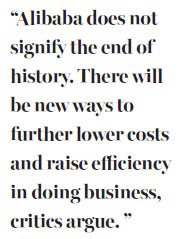What Alibaba's rise really means
Updated: 2016-03-25 08:26
By Ed Zhang(China Daily Europe)
|
|||||||||
The e-commerce giant's much-ballyhooed sales figures are impressive, but their significance does not lie where it might seem
Chinese media that covers technology businesses (mainly the so-called technology, media and telecommunications sector) is a lively part of the industry, dominated by a number of commentators who are usually hard to please.
They did not seem so encouraged by the claim by Alibaba, operator of a Chinese e-commerce market, that last year it generated up to 3 trillion yuan ($462 billion; 412 billion euros) in retail volume on the several platforms it has been running. It's approaching the sales volume of Wal-Mart, and larger than many countries' GDP figures, according to the claim.
Some cast doubt about the company's trading data, which may contain transactions that traders claim for various business reasons. Some were quick to point out that running online markets is different from running a retail business; it's more like a commercial real estate company, such as owning a traditional department store, where the real estate owner doesn't really run the retail business.

One commentator wrote on Huxiu, a technology business commentary website, that it remains a question as to how much Alibaba's 8,000 staff members contributed to such a huge retail volume. The company should mainly be thankful to the 10 million-plus retailers on its platforms, and China's 3 million delivery people, for its performance.
More importantly, Alibaba does not signify the end of history. There will be new ways to further lower costs and raise efficiency in doing business, critics argue.
At the same time, Alibaba itself said it was already beginning a new game, a 10-year development strategy (longer than the government's new five-year plan), to use cloud computing to expand its reach to the Chinese countryside and worldwide. Following that direction, as one may imagine, e-commerce would transform itself from simply gathering retailers (providing online shop space for them) to helping more people (whether or not they had traditional retail experience before) develop their businesses.
The company didn't say it, but that's the way to go for anyone who wants to reach out to his or her customers or readers or people potentially sharing the same interests. This kind of service market can be enormous, especially in a country where traditional commerce or any kind of distribution system remains inadequate and hard to develop because of various barriers, geographic and bureaucratic.
Now there is the Internet, mobile Internet and search functions. They are primarily a service for people to look for someone or something. An online marketplace like Alibaba is only a service for merchants and customers to meet more conveniently. And as for who is selling genuine goods and who is selling fake goods, it's only for the customers to find out by themselves. The company does some policing, but in the end it cannot substitute for the government.

Services for reaching out effectively remain poor, except for some online versions of traditional advertising. That was why micro blogs and Twitter-like messaging were once popular in the desktop reading era. For the age of mobile social networks, in China, neither WeChat (an app developed by Tencent) nor Alibaba's online payment service is convenient enough.
Chinese spending on overseas travel, according to the latest figure from an international industry association, surged more than 60 percent last year. But not only is it hard for Chinese people, whatever their travel document, to book overseas tours with a friendly service, at their desired time and price, it is also rare for merchants, large or small, to showcase their services and facilities in the friendly "Internet way".
Increasingly, travel groups are being organized through word of mouth in social networks, led by individuals who are knowledgeable about traveling to some particular place in some particular way. And word of mouth is reliable only within small circles built on familiarity. Once an Internet service begins to tout business to strangers, it is more often than not taken as a scam, as often is the case in reality.
The same, if not worse, situation can be found in the provision of medical, educational and retirement-related services. It is still by luck that teenagers can find the teachers and teaching environments that suit them for extracurricular courses taken during their vacation time.
So the 3 trillion yuan annual revenue claimed by Alibaba can also be seen as an indication of how large China's untapped market may be. Like many other astonishing sales figures and phenomena, such as people lining up at night to buy luxury properties in Shanghai, it only shows how much money the Chinese middle class have and are waiting to spend as they wish - if only the old barriers are overcome.
The author is editor-at-large of China Daily. Contact the writer at edzhang@chinadaily.com.cn
(China Daily European Weekly 03/25/2016 page12)
Today's Top News
President optimistic for Sino-German cooperation
Info sharing 'is key' as Europe faces terror threat
Uneasy times as Belgium mourns the dead
Belgian bombing suspect still at large: Prosecutor
Belgian media withdraws reports of suspect's arrest
Brussels bombers were brothers El Bakraoui
Chinese citizens in Belgium get help after attack
Europe ramps up security in wake of Brussels attacks
Hot Topics
Lunar probe , China growth forecasts, Emission rules get tougher, China seen through 'colored lens', International board,
Editor's Picks

|

|

|

|

|

|






